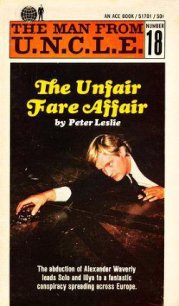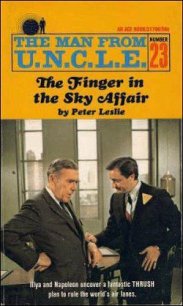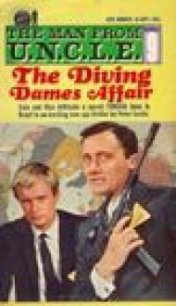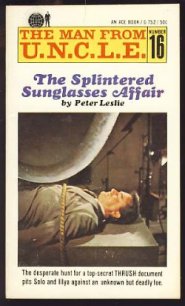The Radioactive Camel Affair - Leslie Peter (е книги txt) 📗
Solo waved and jumped lightly to the flat roof. The curtain slid back over the window.
The drop to the alley was about fifteen feet. Even in his rubber-soled sneakers, he seemed to himself to make quite a noise when he landed. But nobody appeared to have heard; no voice questioned him and no footsteps advanced. After waiting a moment, listening, he ran lightly off in the direction the girl had suggested. The beaten earth road inside the wall of the town was deserted. Just before he got to the fifth turning, he saw the back of a patrolling sentry silhouetted against the sky on top of the wall. But he had reached the safety of the corner before the man had reached the end of his beat.
The mosque was nearly a quarter of a mile down the quiet street. There was one dangerous spot, when he had to cross an open space between the end of the street and the domed building—but the few passersby were all facing towards the lights of the bazaar, which showed through an archway on the far side. Shouts of command from the soldiers could still be heard above the hubbub of the market.
Solo passed noiselessly behind the watchers and turned the corner of the mosque. Two minutes later, he was jumping for the top of the wall bounding the encampment. Peering cautiously over the top, he saw that he had overestimated the distance by about two yards. He dropped back into the lane and climbed up again behind his bivouac. Then, lowering himself quietly behind the tent, he lifted the back flap and crawled inside with a sigh of relief.
As soon as he had stripped off the bush shirt and shorts and resumed the burnoose, he looked out across the square from the front. Flares had been set up where the beasts were tethered. One of the horses was restive, snorting and rearing on the end of its rope. There was a group of soldiers lounging by the entrance to the alleyway down which he had made his escape, and, nearer at hand, Ahmed was pacing up and down with a tall, dark man in Arab robes.
“I don’t see how he can have got away,” the camelmaster was saying angrily. “We had the whole street bottled up….I don’t think it likely, but just in case he did come from here, I am asking the soldiers to arouse all these people”—he gestured towards the corner of the encampment where Solo and the other pilgrims were quartered—”and get them out so we can have a look at them.”
The tall man took his arm. “It is not necessary,” he said. “There are plans, my friend, of which you know nothing. Leave it.”
Solo withdrew like a tortoise into his bivouac and rolled himse1f in his sleeping bag. Ten minutes later, he was asleep.
Chapter 9
The Retreat of Napoleon
THE RENDEZVOUS WITH the cavalry was outside the south gate of Wadi Elmira. From here, the pilgrims continued along the left bank of the river, while the pack train negotiated a ford and climbed up into the hills on the right.
Napoleon Solo kept his head well down as Ahmed rode up and down the long line of camels and horses with a Sudanese officer, separating the travelers and their beasts into two sections. The dromedary with the red, yellow and black striped blanket roll was one of a string of three led by a paunchy Bedouin immediately behind the head of the column. The camel-master’s heavy features were set in their usual scowl as he maneuvered his horse in among the throng of riders, roughly shepherding them into the correct line.
Solo kneed his camel as unobtrusively as he could towards the file of pilgrims, hoping to escape notice while Ahmed’s back was turned. But the army officer saw him move and called out, “Hey! You, there! Where do you think you’re going?” He spurred his horse towards the agent, cursing freely. Fortunately Ahmed was disputing some point with a burly pilgrim and did not come with him.
“I was but joining my fellow pilgrims,” Solo said meekly as the soldier reined up beside him.
“You wait until you are told. And that is a strange manner in which you speak, my friend,” the officer said.
“My speech is not as yours by virtue of the fact that I have traveled far,” Solo said. “I come from Al Khuraiba in Saudi Arabia.”
“Hmm. Well, see that you do not get out of line again.”
The cavalryman wheeled his mount and rejoined Ahmed.
When his turn came, Solo showed his papers with bent head and suffered himself to be pushed into the line of pilgrims. The camel with the striped blanket, as he had expected, was with the other train.
A few minutes later, the pilgrims and their escort moved off along the river bank while the baggage train with its attendant squadron splashed across the ford and began climbing the rocky trail on the far side. Solo deliberately lagged, hoping that he would have a chance to break away from the caravan and somehow rejoin the other train undetected. After a half mile, his chance came—the trail wound through a twisting gorge—and all the escorting soldiers were up at the head of the column. He reined in his beast behind a group of enormous boulders and allowed the others to move slowly around the corner out of sight. Then, turning about, he rode back up the trail as fast as the dromedary would go.
Fording the river, he urged the animal on up the steep path followed by the baggage train. The road mounted steadily past tiny squares of cultivation planted with millet, maize and sorgho, through a belt of trees, and across an exposed slope of bare rock before turning unexpectedly to the right and following a dried-up valley towards the crest of the ridge. A huge natural tunnel through the porous limestone led beneath the ridge itself—and on the far side he could see, far down the slope, the long line of horses and camels he was trying to join. If he could manage to link up with the caravan without being noticed, there was a slim chance that he could stay with it at least until nightfall. The track, although it was dry, produced very little dust from the passage of the camel’s feet. He rode on down, steering his swaying mount behind the shelter of every rock outcrop and pile of boulders that the terrain offered.
An hour later, he was within a quarter of a mile of the caravan. Clearly around the bends in the trail he could hear the sounds of its progress. He took the chance to close up when the route was following a tortuous path between an alternating series of dried-up alluvial deposits. If only there were no cavalrymen riding at the back when he tagged on…
But when he rounded the last corner and caught up, he saw that his luck had changed: two horsemen in uniform were riding behind the last pack camel.
Before he had time to withdraw, one of them turned around and saw him. There wasn’t a chance of escape: the men were carrying rifles across their cruppers, and anyway a horse could run rings around a camel. Fuming inwardly, he rode straight ahead until he caught up with them.
“What the devil do you think you are doing?” the man who had seen him said roughly. “Show me your papers at once.”
While the other soldier kept him covered, Solo reached inside the folds of his robe and produced the documents. “But you should be with the other train!” the soldier exclaimed. “Who are you and what are you doing here?”
“I got lost. I was wandering about when I heard the sound of your caravan and thought it might be the one I missed—”
“Impossible. The others are miles away on the other side of the river. You couldn’t have got here by mistake. Here, Ali: ride up to the front of the column and fetch Ahmed and the captain while I keep an eye on this man.”
The second cavalryman spurred his horse and rode away after the disappearing caravan while Solo remained motionless under the other’s watchful guard. In a few minutes, four horsemen galloped into sight around a bend in the trail: the soldier, Ahmed, the officer who had spoken to Solo before the trains separated, and a tall, dark man on a splendid gray mount. It was the stranger Solo had seen talking to Ahmed in the square the previous night.




![[The Girl From UNCLE 04] - The Cornish Pixie Affair - Leslie Peter (электронная книга .txt) 📗](/uploads/posts/books/56865/56865.jpg)